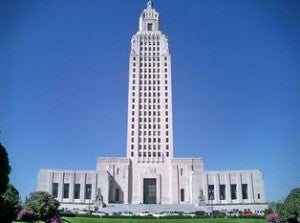2015 Louisiana Legislative Session: Coastal Wrap-Up
By Cynthia Duet, Deputy Director, Audubon Louisiana
The 2015 session of the Louisiana Legislature has come to a close. Although the last two months have been filled with difficult decisions for lawmakers trying to balance the state budget during this important fiscal session, bills related to coastal restoration projects, programs and funding remained the primary focus of Mississippi River Delta Coalition policy staff.
to a close. Although the last two months have been filled with difficult decisions for lawmakers trying to balance the state budget during this important fiscal session, bills related to coastal restoration projects, programs and funding remained the primary focus of Mississippi River Delta Coalition policy staff.
The Louisiana Legislature demonstrated continued commitment to coastal restoration and protection issues by passing HCR1 – the resolution that allows for passage of the 2015-2016 Coastal Annual Plan. The plan is the funding report and projections document that shows where, when and how funding will be expended on restoration of the coast for protection of the people, wildlife and industries of Louisiana. The resolution was sponsored by Representative Gordon Dove, Chairman of House Natural Resources Committee, recognized as a long-time coastal supporter from the Terrebonne area. He is now wrapping up his last term in the House.
There were many items monitored this session that either did or would have had an effect on the coastal fund and coastal habitats. Some of the highlights are noted as follows:
- House Concurrent Resolution 1 (HCR 1) – already mentioned, the funding vehicle for the Coastal Protection and Restoration Authority’s 2015-2016 annual plan for integrated coastal protection and restoration passed with overwhelming support through both state houses. The Coastal Annual Plan funds coastal restoration and hurricane protection for a three-year period through the authorization of $884 million in spending towards new and existing projects. This authorization will fund some of the 19 priority projects for restoring Louisiana’s coast as identified by the Restore the Mississippi River Delta coalition.
- HB 352 – This bill transferred oversight authority for a state-negotiated agreement allowing coastal landowners to retain their mineral rights into perpetuity if they donate their surface rights to a certified organization for the purposes of implementing a coastal integrated project. The authority, established by legislation in 2006, was moved to CPRA from DNR, consistent with the current structure of the state’s coastal program. The bill is currently awaiting signature of the governor.
- HB 288 – This bill sought to prohibit the importation and release of feral hogs and restrict the transportation of feral hogs, except by permit. The spread of feral hogs is linked to transport and release. The bill failed in committee. Feral hogs damage levees, destroy coastal marsh and other wildlife habitat, reduce crops, and prey upon livestock and wildlife.
- HB 167 – This bill would have allowed nighttime hunting of feral hogs and coyotes year round on private property, including during deer and duck seasons. HB 167 did not pass out of Senate Natural Resources Committee due to concerns that the proposed changes to the law would make enforcement of illegal nighttime hunting incredibly difficult, essentially encouraging poaching. The law as it stands allows a landowner to control feral hogs on their property year round via a permit for nighttime hunting of feral hogs when night hunting is not legal during September through February. Both bills sought to address the exploding feral hog population, however, a more coordinated effort is needed to address this scourge on Louisiana’s landscape. The feral hog population is estimated at more than 500,000 and increasing every year.
- SB 196 – This Senate Bill proposed a Constitutional Amendment to ask voters to repeal constitutional protections for funds including the Louisiana Wildlife and Fisheries Conservation Fund, Oilfield Site Restoration Fund, Oil Spill Contingency Fund, Artificial Reef Development Fund, and the Atchafalaya Basin Conservation Fund.
- HB 523 – This proposed constitutional amendment to ask voters to repeal constitutional protection for a number of funds, including the Coastal Protection and Restoration Fund, Barrier Island Stabilization and Preservation Fund, and the Atchafalaya Basin Conservation Fund. As a reminder, all funds constitutionally protected went before the voters to approve that protection at some point.
There were several bills that, due to the state’s budget crisis, were being contemplated early in the session as a way to free up money to balance the $1.6 billion budget hole. The two bills proposing to remove constitutional protection for key funds failed to make it out of legislative committees. Fortunately, these items did not gain traction and the budget issues were handled in other ways, for now. However, there remains a need to stay ever vigilant during future sessions. The discussion about whether funds should be protected under the constitution or be free for lawmakers to apply to other uses will likely continue as the state grapples with expected budget challenges in the coming years.
In summary, as the 2015 fiscal session wrapped up, much concern still remains regarding the state’s budget, and the likelihood remains high that a special session may be called by the new administration at the beginning of 2016 to look for solutions. Amidst the obvious difficulties, coastal protection and restoration projects remain on the course that they have been on for several years, and the funding of projects from RESTORE Act and the GOMESA are closer than ever to becoming a reality to repair our damaged coastline.
For more information on the projects that can save Louisiana’s coast, please visit: http://www.mississippiriverdelta.org/restoration-projects/map/.